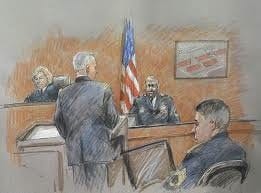We are finishing our series on defending criminal cases involving forensic evidence. The final counsel for lawyers battling prosecutors on this front is don’t be afraid. Frequently, when defense lawyers are confronted with the results of forensic testing they give up and begin looking for a plea. To successfully defend these cases we must be willing to study and understand the forensic evidence. Not only the science and technique involved, but also the evidence collection, storage, and processing steps. We should utilize as many resources as possible to develop credible arguments. We must think deeply about our cases. But effective brainstorming takes time, lots of time. Only after many weeks or months on a case do we start developing high quality ideas.
defense lawyers are confronted with the results of forensic testing they give up and begin looking for a plea. To successfully defend these cases we must be willing to study and understand the forensic evidence. Not only the science and technique involved, but also the evidence collection, storage, and processing steps. We should utilize as many resources as possible to develop credible arguments. We must think deeply about our cases. But effective brainstorming takes time, lots of time. Only after many weeks or months on a case do we start developing high quality ideas.
Bryan-College Station defense lawyers should be bold and aggressive . . . applying for funds to hire experts and developing good records for appeal when these applications are denied. Also, be daring and ask prosecutors about their theories. “No” is the worst thing they can say to you. I would advise young lawyers to seek out mentors—lawyers they trust and who have experience using forensic evidence. Watch how experienced lawyers handle these cases. It’s an effective way to expand your courtroom horizons. This includes the array of existing forensic techniques and how they can be helpful in a given case. But understanding the science is only half the battle. Learning to successfully cross-examine a prosecutor’s expert takes watching, learning, study, and much practice. Plan on working nights and weekends to learn what you need to know. Develop relationships and always be willing to ask for help. The most meaningful aspect of this profession is enjoying a job well done. Sometimes that’s all you get. Win or lose, an effective cross-examination of your opponent’s expert is fun. You will develop a reputation . . . a reputation for working hard and being courageous. A reputation as the “go to” lawyer in town. Nothing could be more professionally rewarding. And remember . . . this is a battle of ideas. Work hard, prepare the best ideas, and you’ll enjoy professional satisfaction.
Utilizing forensic evidence to prosecute and defend criminal cases will only increase over time as new technologies develop and old ones become less expensive. In this same vein, the “CSI Effect” has influenced potential jurors everywhere. Jurors expect to see forensic evidence in criminal trials. The good news for defense lawyers is this expectation can be used to their advantage, particularly when the forensics are effectively tied to the prosecution’s burden of proof. And not all experts need to testify at trial. Many times the lawyer simply needs a consulting team member to help them understand the forensic technique and prepare for cross-examination.
There are always tactical considerations when deciding whether to utilize forensic evidence. Since a defense lawyer’s credibility is their most valuable trial asset, every decision we make must consider its preservation. Fighting losing battles with experts reduces your credibility and persuasive power. Calling a poor witness is often worse than calling no witness at all. Turn the prosecution’s expert into “your” witness whenever possible. Lastly, be prepared to work very hard when preparing for a forensic case. Don’t be afraid of the evidence. Decide you will find the “cracks in the armor” and dig in. Learn as much as possible through self-study and the help of others. If you cannot successfully attack the forensic evidence, then determine how to explain it away.
Good luck on the courtroom battlefield.


